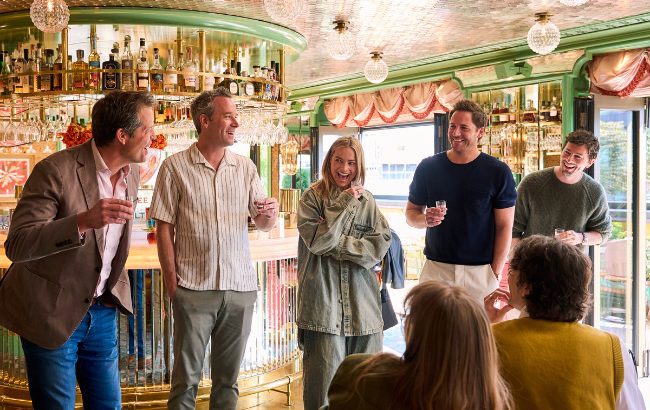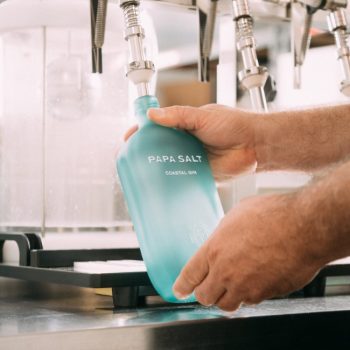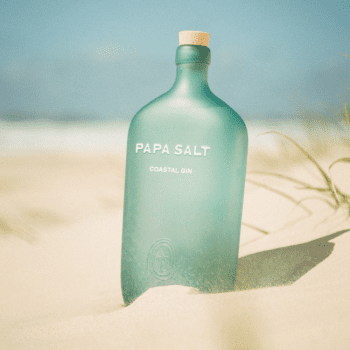Does Australian gin need a designation?
By Rupert HohwielerPapa Salt co-founder Charlie Maas explains the challenges of exporting Australian gin, as well as the “big opportunity” the category has abroad.

California-based Charlie Maas co-founded Papa Salt with Barbie actor Margot Robbie and three film industry friends, and serves as the brand’s CEO.
Speaking to The Spirits Business, he says the Byron Bay-inspired gin is growing and doing well at home in Australia. However, he believes exporting could be made easier if there were a more unified approach from the sector.
Although Australia has access to extraordinary botanicals and native plants, according to Maas, “the problem is that oftentimes producers can’t export these ingredients to other countries”.
For instance, Papa Salt’s main botanical is wattle seed. “I can’t bring it into the US,” Maas says. “Very few people drink gin in the US – it’s 1% to 2% of total spirit sales in the US market – but it is still the second-biggest gin market by cash value in the world.”
He questions if the solution lies with the Australian government, or if the nation’s gin producers need to come together to get their botanicals approved in the 10 biggest gin markets.
Papa Salt is in the process of getting wattle seed approved for import by the US Food and Drug Administration (FDA). However, it has taken two years and “an enormous amount of money”. Maas says: “Wattle seed is such a common ingredient in Australia. It’s been in Australian diets for thousands of years. It would be good to have some help pushing this out and getting it approved.”
He believes that if the Australian gin community banded together and had more help from the government, “Australian gin could really make a name for itself internationally”. “Not to say it hasn’t yet, but it’s not on the level of Japanese whisky or London Dry gin,” he added. “We know Stu Gregor well, who co-founded Four Pillars. I’ve never met the Archie Rose guys, but I really admire their products. The Brookie’s guys make great gin. It’s an amazing community of people, and they’re making quality products.

“I do wonder if we should be banding together to sell Australian gin abroad.”
It isn’t just Papa Salt that’s had issues with selling Australian-made products abroad. The Four Pillars co-founders, Cameron Mackenzie and Gregor, struggled with their Bloody Shiraz gin. “People didn’t understand Shiraz on a gin label and the US was worried about blood. They asked if actual blood was in the gin,” explains Maas. “It would really help to have that coordinated effort to export and support. A lot of us are trying to do it on our own – and you’re going up against the FDA.”
Maas notes that the Australian government does offer some programmes to support exports, however some policies limit spirits. Spirits tax in Australia increases twice a year, something the country’s distillers have been vocal about. It’s also the third-highest spirits tax in the world.
“Excise was paused locally on draft beer to make a pint cheaper. Yet with spirits, we’re still paying more than wine,” Maas says. “It just doesn’t seem fair to the spirits producers when you have a really big opportunity to support them.”
The high tax makes it very difficult for brands to get local business, while at the same time, most Australian gin brands aren’t exported. This situation makes launching a brand in the country “super hard”, says Maas.
“The excise is the hardest part about that first step. Some people might say: ‘Oh, you can get the first AU$400 [US$260] back in excise rebates’, but there’s a lot that goes into having to get that approved locally. It’s not as easy as saying: ‘I made a gin and I get my money on my excise tax rebate’. It is onerous for small brands, and it just crushes your cash flow.”
To go beyond domestic, it takes a bigger operation and much more investment, he says. “You have to get different labelling and approvals and that’s all tough. If you’re making gin and just selling it in Australia, it’s pretty hard to make a living.”
Leading with native Australian botanicals
Despite the challenges of being Australian-made, which include the lengthy distance from major markets, Maas says producing and exporting from Australia was important to the co-founders.
However, Papa Salt has had to keep its price artificially low in Australia to compete. “We support the on-premise as much as we can. We want Australians to like the product and be proud of it, but we have no illusions that we’re going to make money selling gin in Australia. Our plan is really to make an iconic Australian product and then export that.”

For Australian brands that want to go global, Mass believes “the baseline is there”. “People in LA, London and major cities across the world are excited to go to Australian restaurants. They’ve been drinking Australian wine for a long time. There just needs to be more coordination between producers and the government to make it easier to export and promote.”
He suggests an equivalent to a protected designation of origin (PDO) in Europe, or something similar regarding providence, could be one way of achieving this. “Maybe we should be pushing for something like a designation. They are very unique products made very well, and you can only make them in Australia. If it’s based off of Australian botanicals, maybe that’s an answer.”
In terms of establishing Australian gin, he believes the category is “not bound to a convention.” “Consumers are open to a lot of different ideas, and there’s a whole bounty of plants that don’t exist anywhere [else]. You can make gins that you literally can’t make anywhere else.
“You’re never going to be able to compete with these things that have been going on for 100 to 200 years, but I think it’s an interesting idea,” he says about going up against London Dry gin.
“Japan’s been making great products for 100 years, but in the past 10 years, people try the whisky because it’s Japanese. In Australia, you could do that with gin. The products are good enough, the flavours are versatile enough and there’s enough variety… but also enough consistency.”
It has been said that Australia could reach AU$1 billion in spirits exports if the government froze the twice-yearly tax hike on alcohol.
A parliamentary inquiry earlier this year recommended the creation of an Australian spirits trade body, with the hope of unlocking that export potential.
In August, meanwhile, the Spirits Victoria Association (SVA) released a government-backed plan that aims to double spirits exports by 2030.
Related news
Salford Rum maker launches its first gin
